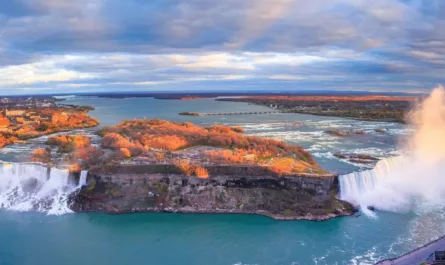In 2019, a heartwarming photo from Virunga National Park in the Democratic Republic of Congo captured global attention: two orphaned mountain gorillas, Ndakazi and Ndeze, standing upright and posing like humans alongside their ranger caretakers, Mathieu Shamavu and Patrick Ndakasi, at the Senkwekwe Center. The image, showing the gorillas’ playful mimicry and the rangers’ smiles, revealed the deep bond formed through years of care after the gorillas lost their families to poaching. Yet behind this joyful moment lies the perilous reality of the rangers’ work, risking their lives daily to protect endangered wildlife in one of the world’s most volatile regions.
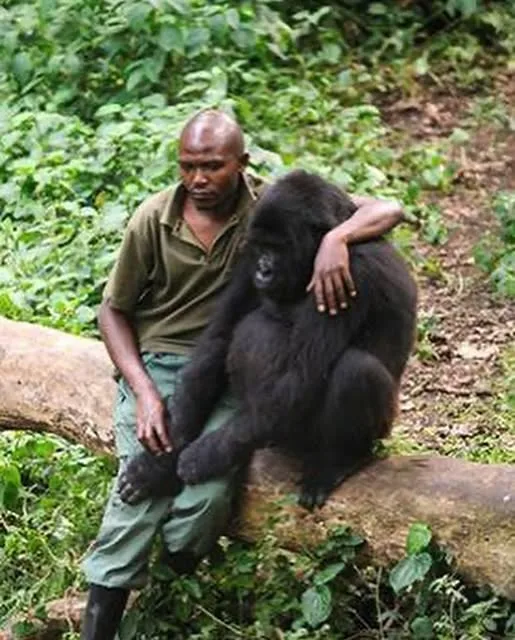
A Playful Selfie with a Poignant Backstory
The viral photo, taken on April 18, 2019, at the Senkwekwe Center in Virunga’s Rumangabo headquarters, showed Ndakazi and Ndeze, then about 12 years old, standing tall with relaxed postures, mimicking their caretakers. Shared on social media with the caption “Another day at the office,” the image exploded in popularity, featured by outlets like BBC and The Washington Post. The gorillas’ human-like behavior stemmed from their upbringing at the Senkwekwe Center, the world’s only mountain gorilla orphanage, where they were raised after their families were killed by poachers in 2007. Found clinging to their dead mothers at two and four months old, the infants were too vulnerable to return to the wild, leading to their lifelong care by rangers like Andre Bauma, Mathieu Shamavu, and Patrick Ndakasi.
The gorillas’ imitation of their caretakers, as explained by ranger Shamavu, reflects their close bond. “They like to mimic everything we do,” he told The Guardian, noting that Ndakazi and Ndeze, raised like family, often copy human movements. This connection, built through feeding, playing, and constant companionship, made the selfie a genuine snapshot of trust and affection.
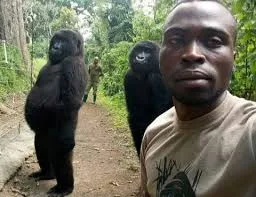
The Senkwekwe Center: A Haven Amid Conflict
Established in 2009 and named after a silverback gorilla killed in the 2007 Rugendo family massacre, the Senkwekwe Center provides a sanctuary for orphaned mountain gorillas. Located near Mikeno Lodge in Virunga, it houses a handful of gorillas, including Ndakazi (who passed away in 2021), Ndeze, Matabishi, and Yalala, all victims of poaching or conflict. The center’s lush, enclosed forest mimics their natural habitat, with electric fences keeping out other primates like baboons. Caretakers, supported by Gorilla Doctors and park staff, monitor the gorillas’ health, treat injuries, and provide a family-like environment, as wild reintegration is often too risky due to ongoing threats.
Virunga, Africa’s oldest national park (founded 1925), spans 7,800 square kilometers in North Kivu, hosting a third of the world’s 1,063 mountain gorillas, alongside chimpanzees, lowland gorillas, and diverse wildlife. Despite a 47% population increase since 2007, gorillas face constant danger from poaching, snares, and human-transmitted diseases, exacerbated by the park’s location in a conflict zone plagued by militias like M23 and FDLR.
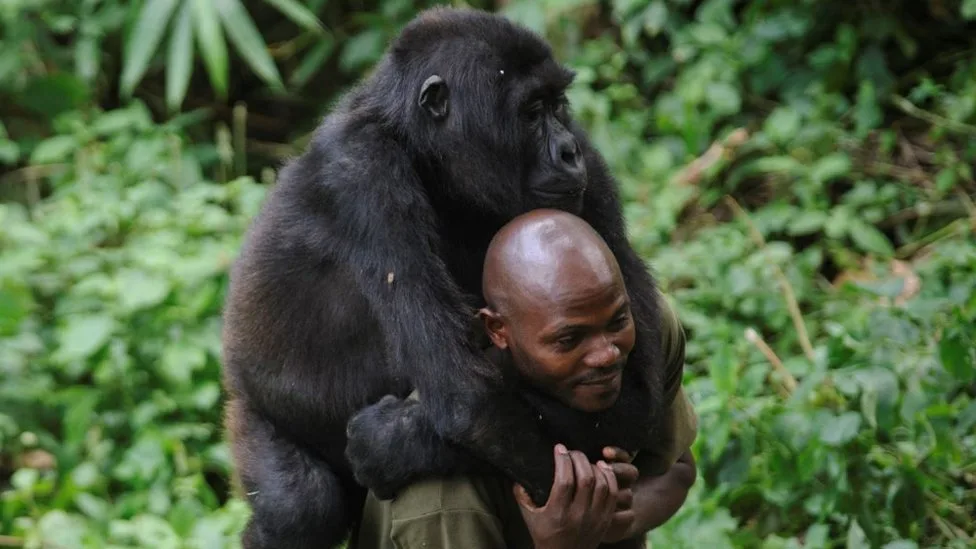
The Rangers’ Deadly Mission
The rangers’ lighthearted selfie belies their dangerous reality. Virunga’s 770+ rangers, trained in combat tactics and human rights, face relentless threats from poachers, illegal charcoal traders, and armed groups vying for the park’s resources. Since 1994, nearly 200 rangers have been killed, including 13 in a 2020 ambush and six in a 2021 attack. In 2025, poaching surged in M23-occupied areas, with a 50% wildlife decline since 2021, despite efforts like 8,461 km of patrols and 46 snare removals in 2024. Rangers use bloodhounds to track poachers and satellite collars to monitor elephants, but the park’s vast size and rebel control make protection daunting.
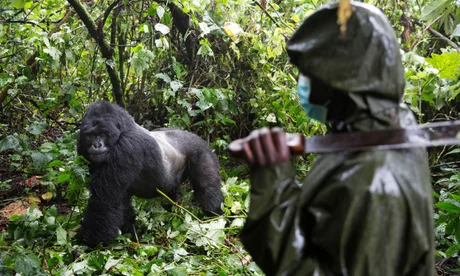
The selfie rangers, Shamavu and Ndakasi, survived a false rumor in 2020 claiming they died in an ambush, clarified by Virunga and Reuters. However, the risks are real—park director Emmanuel de Merode was shot in 2014, and rangers like Assani Sebuyori Mapine were killed for disrupting bushmeat trade. Despite these sacrifices, rangers remain committed, driven by the park’s mission to protect biodiversity and support local communities through tourism and hydropower projects.
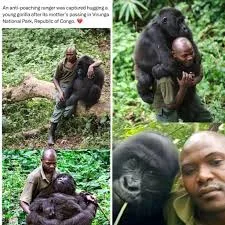
A Bittersweet Legacy
The viral photo of Ndakazi, Ndeze, and their rangers is a beacon of hope, showcasing human-animal bonds and conservation success—Virunga’s gorilla population has grown from 350 in the 1980s to over 1,000 in 2024. Yet it underscores the rangers’ perilous duty in a war-torn region. Ndakazi’s death in 2021, cradled by Bauma, marked a loss, but Ndeze and others carry on her legacy at Senkwekwe. The image, a fleeting moment of joy, reminds us of the courage behind every smile, as Virunga’s rangers risk everything to save a fragile wilderness.
